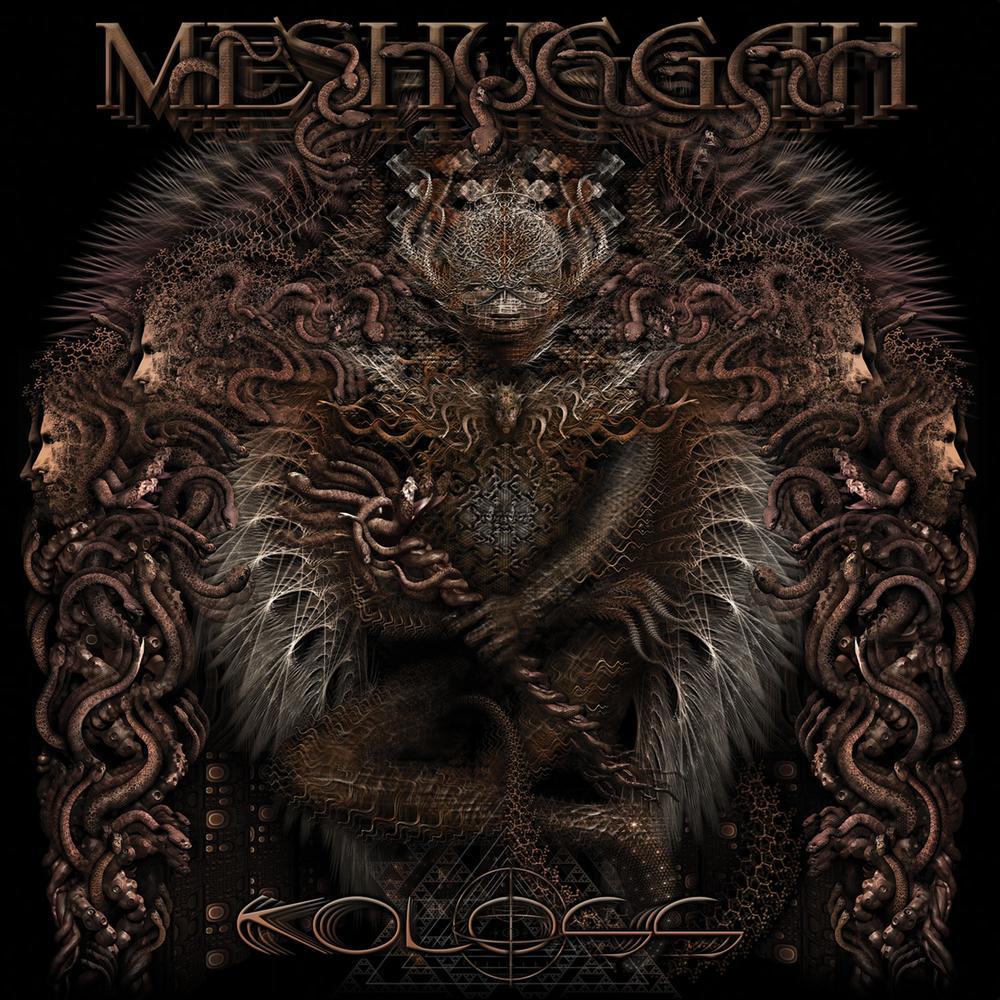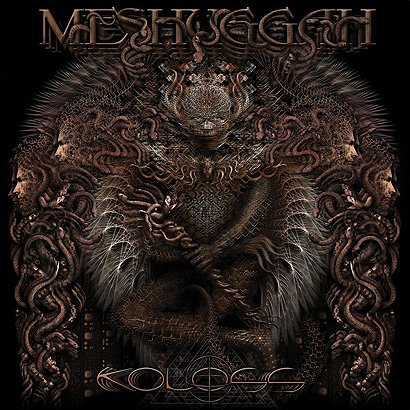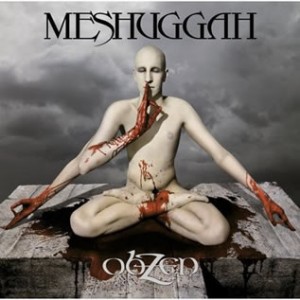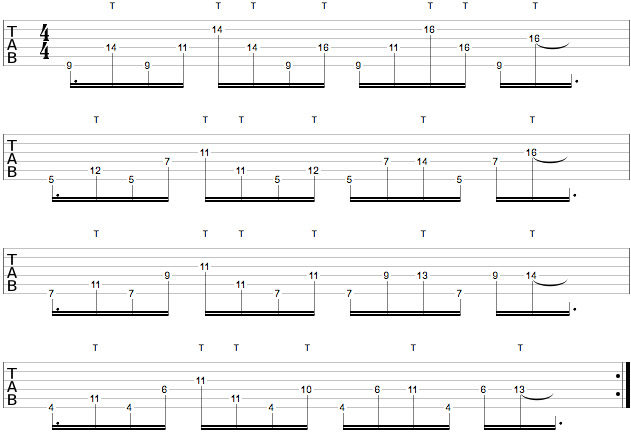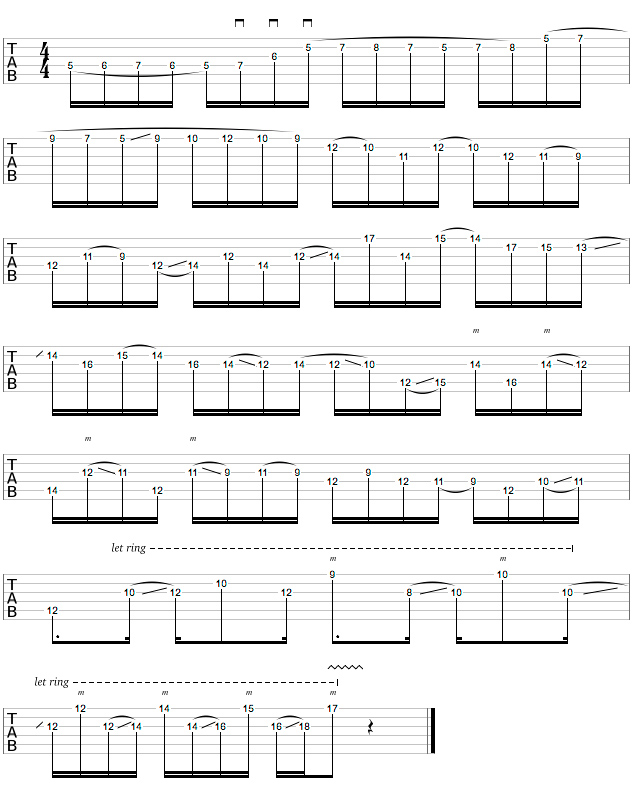Few bands can claim to be both mirror and hammer to the modern metal scene, at once reflecting the zeitgeist whilst forging its future. And yet Meshuggah have managed to do just that for two decades. For a band built up from relative obscurity in the early nineties, the savage Swedes have strayed little from their brand of esoteric thrash. Their success comes from the metal scene’s migration towards them, rather than the other way around.
As their death and grind peers exhausted themselves on the limits of speed and volume long ago, Meshuggah have proven to be an asymptote of modern metal – constantly rising, while never hitting the wall. With the release of Koloss, they’ve produced their most mature album to date. They’ve shattered the pale image of their imitators and hammered out a sound that saves detuned guitars from self-parody in one swift swing.
Believe it or not, the album itself even swings. Jens Kidman’s vocals cut through the sludge of album opener ‘I Am Colossus’ with a certain saunter. It’s immediately clear how much a twenty year investment in angular thrash can pay off. Just as smaller combos tested their talents and changed jazz forever by playing over the barline, meaty slabs like the aforementioned ‘I Am Colossus’ and ‘Behind the Sun’ coil tentacles around oblong rhythms in a new embrace. Detractors who may have not been able to dig their past out-of-bounds rhythmic acrobatics just may like the shade of this octopus garden.
This is not to say Koloss is Meshuggah’s most accessible offering, just their least obtuse thanks to a steelier swagger. Where their metric gymnastics once had the clattering cacophony of Optimus Prime falling down Mt. Everest, their efforts now sound like the boss Autobot surfing a tsunami atop an aircraft carrier.
While tracks like the killer ‘Break the Bones Whose Sinews Gave it Motion’ recall the slow churn of Nothing, this collection stands as the band’s most versatile offering yet, balancing break-neck assaults with down tempo groovy cuts that rarely bleed together. ‘The Demon’s Name is Surveillance’ hits the ground fast and furious, recalling the days of None. The barreling 4/4 charge, if less heady than we may have come to expect, enables an open string tapping blitz that spirals into their trademark Arctic air raid siren leads. This sustained dissonance, a longtime staple of Meshuggah, finds new real estate in the midrange of the guitar.
| ‘Break Those Bones Whose Sinews Gave It Motion’ music video. |
The bridge of ‘The Hurt That Finds You First’ hosts high-gained reverb howlings that soar and lurch like a scratched Explosions In The Sky record. Fredrik Thorendal and Mårten Hagström finally make full use of their eight-string real estate with droning strings and pads whose lush overtones mesh with the guitar’s midrange. While their previous albums often relied on the harshly hollow divide between the rumbling lows and the piercing highs, the more even-handed mix shines a post-rock light upon the brutal drawl of ‘Do Not Look Down’ and ‘Swarm.’ This wider palate could have easily muddled their once stark sound, but instead the production of Koloss represents a new dawn in the darker tones of metal production.
Many of Meshuggah’s imitators have been engaged in a race to the bottom of the frequency spectrum, sometimes leaving the listeners to wonder if they’ve traded their guitars for high gauge rubber bands. As a result modern riffs have become dangerously close to losing tonality for the sake of a purely percussive quality (can anyone actually sing a djent riff?). Not so with Koloss, as the low riffs hit so precisely and deep that they could strike oil. The enhanced note saturation even lends richer overtones and harmonies to the slinging theme of ‘Marrow.’
The highest praise one could attribute to Koloss is just how organic it all feels. The current state of Meshuggah might be best depicted by how the band members’ faces emerge from the serpentine robes of the demon enthroned on the album’s cover art: they’ve merged as mere appendages to something more monstrous and fierce than the sum of their individual parts. For all of its impeccable production, surgical execution, and furrowed-brow brooding, Meshuggah makes the album’s writhing fireworks feel effortless. And for once, it seems like they’re actually having fun. Just check out the solo section of ‘Don’t Look Down’ where Hagström and Thorendal commit schizoid vacillations between Slash and Allan Holdsworth and try to not picture them grinning beneath waterfalls of sweat.
After the strenuous touring behind obZen pushed them to new peaks of their abilities, Koloss is the sound of an effortless rebirth, a band emerging from its mechanical carapace as a sleeker reflection of themselves. If djent is analogous to the hard bop days of the mid 50’s with every jazz band trying to outdo each other with spastic tempos and unbridled tenacity, think of Koloss as their own Kind of Blue, a cool recline after a flurry of exhausting endeavors. Meshuggah once again stake a higher ground in their established stomping ground. While this record no doubt commanded the pinnacle of their talents, it’s a long, organic exhale that stands as the new standard for metal in 2012.



